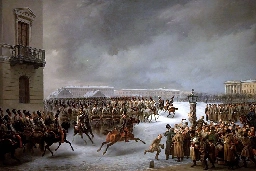Prigozhin as Pugachev or Pilgrim: The Wagner Rebellion in Historical Context
Prigozhin as Pugachev or Pilgrim: The Wagner Rebellion in Historical Context
As with many War on the Rocks readers, I was taken aback by the events of June 23rd to 25th in Russia. This weekend I had the distinct pleasure of

Submission Statement
There's been a lot of discussion about Prigozhin's abortive uprising--probably too much if we're honest. However, I found this article by Alexander Burns still worth sharing. the article is a high-level contextualization of Prigozhin's coup and a comparison of its current state to possible historical analogs. Before reading this article I had been falling into the trap of comparing Prigozhin's rebellion to Soviet political machinations, or to the tsardom that preceded the USSR. However, I was convinced by the historian's argument that the rebellion bore more resemblance to feudal-era coups, and that's the comparison I think I'll lean toward in the future. The aftermath of the Pilgrimage of Grace in particular I think is very relevant here, especially given recent reporting that the criminal case against Prigozhin has not been dropped.
Alexander S. Burns is an assistant professor of history at the Franciscan University of Steubenville, studying the American Continental Army’s connection to European militaries. His edited volume, The Changing Face of Old Regime Warfare: Essays in Honour of Christopher Duffy, was published in 2022. You can follow him @KKriegeBlog.
Part of what held our attention stemmed from surprise. How could Putin’s Russia, a state famously run prioritizing loyalty over competence, be facing a coup? My doctoral advisor, Professor Katherine B. Aaslestad, had the answer. Before her passing in 2021, she constantly reminded her lecture halls and graduate seminars: “Regimes that choose war rarely achieve their goals at the outset. War has a way of changing the situation. War takes on a life of its own.” She most frequently said this in the context of the wars of the French Revolution, but it is the case across military history. While Spartan King Archidamus and Athenian Pericles reluctantly led Sparta and Athens into the Peloponnesian War in 431 BC, neither was alive in 404 when the war ended. The political landscape had been totally reshaped by war, reshaping each side’s goals and objectives with it. We can observe a similar change in Russia today.
Despite all of the possible parallels in Russian history, I believe that the most interesting parallel to the current situation is the Pilgrimage of Grace, a rebellion during Henry VIII’s reign in England.
In October of 1536, Catholic believers in the North of England rose in revolt against the church reforms of Henry VIII. Although their motivations were economic and religious, important similarities between these peasants and Prigozhin exist. They called their rebellion the Pilgrimage of Grace, trying to disguise it as a military movement. They insisted that their grievances lay not with the actions of the king, but with “persons of low birth and small reputation” who were, they claimed, advising him poorly.
Knowing that it would be difficult to stop the pilgrim army, which numbered in the tens of thousands, Henry VIII’s government chose to negotiate. The pilgrims were promised immunity, that a special parliament would meet and address their grievances, and that the king would agree to their immediate demands until the parliament met. Seizing upon a pretext to abandon this pledge, forces loyal to Henry then suppressed a new uprising and executed around two hundred leaders of the initial rebellion.
There are many similarities between Prigozhin’s uprising and the Pilgrimage. Prigozhin referred to the events of June 23rd to 24th as “марш справедливости” or “the March for Justice,” rather than a coup. He insisted that Russian Defense Minister Shoigu, not Putin, was at fault for the failures and that they deliberately misled Putin. Like the Pilgrimage of Grace rebelling against the “evil councillors” of Henry VIII, Prigozhin cloaked a formidable military effort to destabilize the state in language that suggested loyalty to the monarch. Likewise, once the initial emergency had passed, both Henry VIII and Putin appeared all too eager to change the terms of the deal. Although it initially seemed that Putin might have caved to Prigozhin’s demands for Shoigu’s removal, Putin appeared alongside his defense minister in a meeting on June 26th.
What comes next? I’ve previously argued that Prigozhin reminds me of a Freikorps Inhaber rather than Prince Wallenstein, and his possible fate of Belarussian exile reminds me of the story of Polish Prince Jerzy Marcin Lubomirski, a mercenary commander who had to stay one step ahead of his former employers. So where does this leave us? I’ll admit to being quite surprised by these developments, and echo my comments that historians should be historians, not ersatz policy commentators and predictors. History provides a range of possibilities from which to understand the present, and in history, unlike Putin’s Russia, we know where we are in the story. With that said, although cracks are appearing in the foundation of Putin’s Russia, Prigozhin will be lucky to avoid the fate of Pilgrimage of Grace leaders like Sir Robert Aske, who was hung in chains.